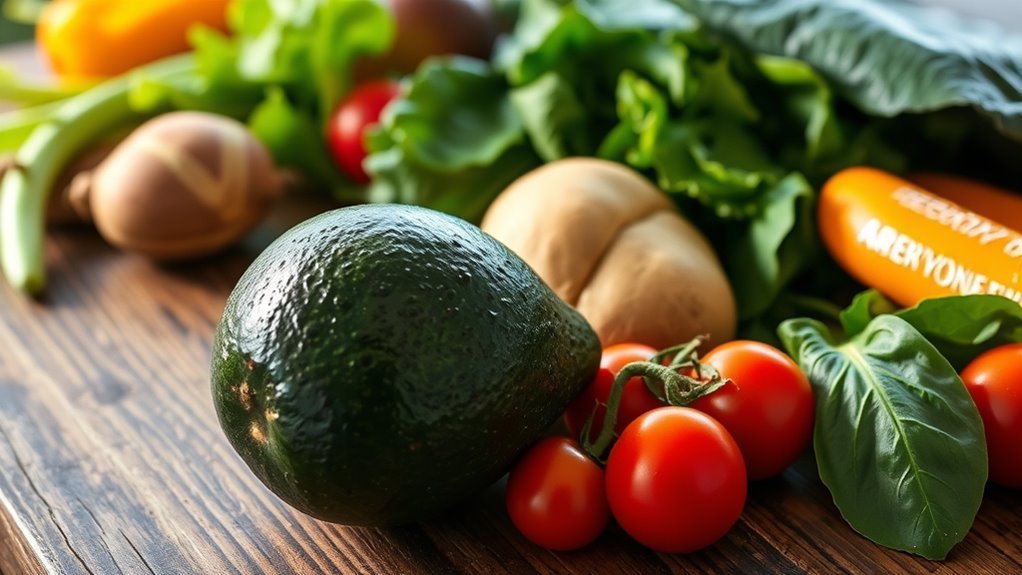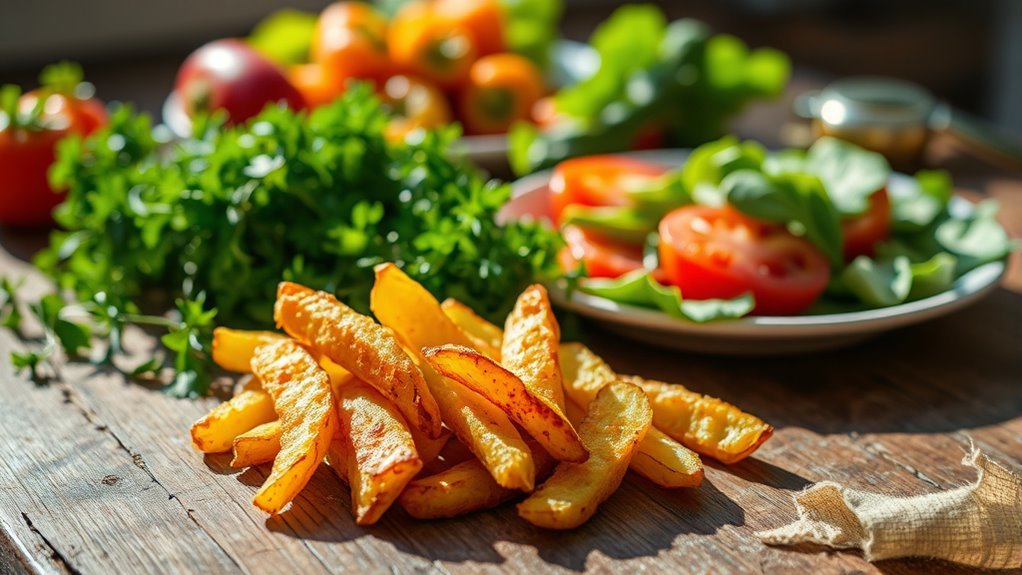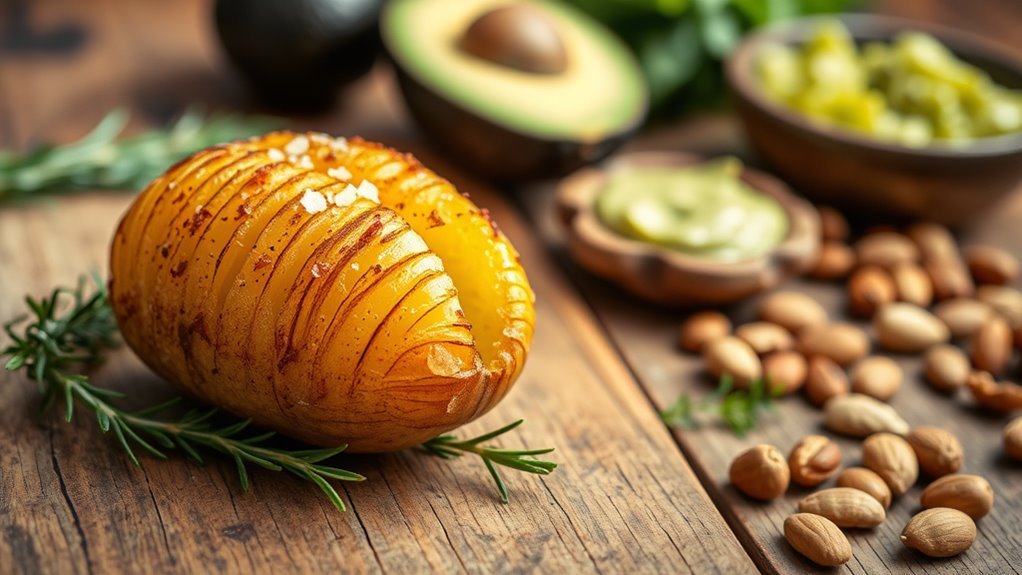You can’t really eat potatoes on a keto diet. They’re high in carbs, which can throw you out of ketosis and spike your blood sugar levels. A medium russet potato has about 37 grams of carbs, making it hard to stay within the recommended 20-50 grams per day. Fortunately, there are tasty low-carb alternatives like cauliflower mash or zucchini fries that can help satisfy your cravings without compromising your keto goals. There’s more to explore on this topic!
Understanding the Keto Diet

To fully grasp the implications of eating potatoes on a keto diet, it is vital to understand the core principles of this dietary approach. The keto fundamentals revolve around drastically reducing carbohydrate intake and increasing fats, pushing your body into ketosis, where it burns fat for fuel instead of carbs. Many diet misconceptions suggest that all carbs are villains; however, understanding the type and quantity is essential. While traditional potatoes are high in carbs, not all vegetables fit neatly into this binary. You might find that other low-carb options can satisfy your cravings without derailing your keto goals. The key lies in balancing your choices, allowing for flexibility while adhering to the diet’s primary tenets, ultimately leading to a more enjoyable and sustainable lifestyle.
Nutritional Profile of Potatoes

Understanding the keto diet’s focus on low carbohydrates sets the stage for examining the nutritional profile of potatoes. While potatoes are a staple food in many diets, they vary greatly among potato varieties. For instance, a medium-sized russet potato contains about 37 grams of carbs, while sweet potatoes have similar counts but offer more vitamins. Nutritional comparisons reveal that potatoes provide essential nutrients like potassium and vitamin C. However, their high starch content makes them less favorable for a ketogenic lifestyle. If you’re considering potatoes, it’s important to weigh these nutritional aspects against your carb limits. Ultimately, understanding the nutritional profile of potatoes can empower you to make informed choices in line with your dietary goals.
Carbohydrates and Ketosis: The Basics

To maintain ketosis, you need to be mindful of your carbohydrate intake, as exceeding your limits can kick you out of this fat-burning state. Ketosis shifts your body’s primary energy source from carbohydrates to fats, which can be beneficial for weight loss and overall health. Understanding how to balance your carbs while on a keto diet is key to harnessing its full potential.
Understanding Carbohydrate Limits
As you begin a ketogenic diet, it’s crucial to grasp the limits of carbohydrate intake that can affect your body’s state of ketosis. Typically, you’ll want to limit carbs to about 20-50 grams per day. This means you’ll need to be mindful of your carbohydrate sources, focusing on low-carb vegetables, nuts, and seeds, while avoiding high-carb foods like potatoes. Prioritize nutrient density in your choices; foods that are rich in vitamins and minerals will support your overall health without pushing you over your carb limit. By choosing wisely, you can enjoy a variety of foods while maintaining your freedom and enjoyment of a ketogenic lifestyle, all while keeping your body in the fat-burning state of ketosis.
Ketosis and Energy Sources
While your body typically relies on carbohydrates for energy, entering a state of ketosis shifts this reliance to fats. In ketosis, your liver converts fatty acids into ketones, which become your primary energy sources. This metabolic shift can lead to various ketosis benefits, including improved mental clarity, sustained energy levels, and reduced hunger. By minimizing carbohydrate intake, you encourage your body to tap into its fat stores, offering a more stable energy supply compared to the quick spikes and crashes associated with carbs. Embracing this fat-based energy system allows you greater freedom in food choices, as you navigate a diet rich in healthy fats. Understanding this shift can empower you on your keto journey, maximizing both energy and well-being.
How Potatoes Affect Blood Sugar Levels
Although potatoes are often considered a staple food, their impact on blood sugar levels can be significant for those following a keto diet. When you eat potatoes, your body tends to experience a rapid blood sugar response due to their high carbohydrate content. This can lead to increased insulin production, which may affect your insulin sensitivity over time. For individuals on a keto diet, maintaining stable blood sugar levels is vital for staying in ketosis. If you’re aiming for metabolic flexibility, it’s essential to understand how foods like potatoes can trigger these responses. If you choose to include potatoes in your diet, consider moderation and balance, as they can disrupt the delicate equilibrium necessary for keto success.
The Glycemic Index of Potatoes
The glycemic index (GI) is an essential factor to take into account when evaluating how foods like potatoes affect your blood sugar levels. Potatoes generally have a high GI, meaning they can cause a rapid spike in blood glucose. Understanding the GI of different potato varieties can help you make informed choices while following a keto diet.
Glycemic Index Overview
Understanding the glycemic index (GI) of foods is vital for those following a keto diet, as it helps determine how quickly carbohydrates can raise blood sugar levels. Potatoes, often viewed as a staple, can greatly impact your glycemic response.
Here’s a quick look at the GI of different types of potatoes:
| Type of Potato | Glycemic Index (GI) |
|---|---|
| Boiled White Potato | 78 |
| Baked Potato | 85 |
| Sweet Potato | 61 |
These values indicate that potatoes generally have a high GI, meaning they can cause a rapid elevation in blood sugar. For keto followers, understanding these numbers is vital for maintaining dietary goals and managing energy levels effectively.
Impact on Blood Sugar
When considering the impact of potatoes on blood sugar levels, it’s important to recognize their high glycemic index. Potatoes can cause a rapid spike in blood sugar, leading to a significant insulin response. For those focused on blood sugar regulation, this can be a concern, especially in the context of a keto diet. The quick digestion of carbohydrates in potatoes means your body releases insulin faster to manage the increased glucose levels. While you might enjoy the taste and comfort of potatoes, understanding their effects on your blood sugar can empower you to make informed choices. If you’re seeking to maintain stable energy levels and avoid blood sugar crashes, you might want to explore alternatives that align better with your dietary goals.
Can You Enjoy Potatoes in Moderation?
How can you fit potatoes into a keto diet without derailing your progress? It’s all about moderation. While potatoes are high in carbohydrates, you can enjoy them occasionally by implementing moderation strategies. Consider smaller portions and balance them with low-carb foods. For instance, pairing a small serving of roasted potatoes with a generous helping of non-starchy veggies can help you stay within your carb limits. Alternatively, explore potato substitutes like cauliflower or turnips, which mimic texture and flavor while being lower in carbs. Remember, the key is to listen to your body and adjust your intake based on your progress. With mindful choices, you can savor the taste of potatoes without sacrificing your keto journey. Enjoy the flexibility!
Low-Carb Alternatives to Potatoes
If you’re looking for low-carb alternatives to potatoes, you’re in luck. Options like cauliflower mash, zucchini fries, and radish hash browns not only satisfy cravings but also fit seamlessly into a keto diet. These substitutes can offer similar textures and flavors without the carbs, making them great choices for your meals.
Cauliflower Mash Recipe
Cauliflower mash has emerged as a popular low-carb alternative to traditional mashed potatoes, especially for those following a keto diet. This creamy dish serves as a keto-friendly substitute, allowing you to enjoy comfort food without sacrificing your carb limits. To make it, simply steam cauliflower florets until tender, then blend them with butter, garlic, and cream until smooth. Season with salt and pepper to taste.
Not only does cauliflower mash markedly reduce carbs, but it also packs in nutrients like vitamins C and K. By incorporating this dish into your meals, you can indulge in a satisfying side dish that aligns with your dietary goals. So, why not give this delicious alternative a try? Your taste buds will thank you!
Zucchini Fries Option
Zucchini fries are a fantastic low-carb alternative to traditional potato fries, offering a crunchy texture and delicious flavor without the hefty carb count. They’re keto-friendly and packed with nutrients, making them a great choice for your low-carb lifestyle. You can easily prepare them by slicing zucchini, coating them in a mixture of almond flour and spices, and baking until golden.
Here’s a quick comparison of zucchini fries and potato fries:
| Nutrient | Zucchini Fries | Potato Fries |
|---|---|---|
| Net Carbs (per 100g) | 3g | 35g |
| Calories | 120 | 365 |
| Fiber | 2g | 3g |
| Fat | 6g | 17g |
Enjoy this guilt-free option while satisfying your cravings!
Radish Hash Browns
Radish hash browns are an innovative, low-carb twist on the classic breakfast staple. If you’re looking for hash brown alternatives that fit into your keto lifestyle, these are a delicious option. Not only do they replicate the texture of traditional hash browns, but they also offer impressive radish benefits, such as:
- Low in Carbs: Perfect for maintaining ketosis.
- Rich in Vitamins: Packed with vitamin C and antioxidants.
- Fiber Content: Supports digestive health and keeps you full.
- Versatile: Easily flavored with herbs and spices to suit your taste.
Creative Ways to Satisfy Potato Cravings
While sticking to a ketogenic diet can often mean saying goodbye to traditional potatoes, there are plenty of creative substitutes that can satisfy those cravings without derailing your goals. Consider using cauliflower as a versatile potato substitute; it can be mashed, riced, or roasted to mimic the texture of potatoes. Turnips and zucchini are also great options for creative recipes, providing a similar mouthfeel in dishes like fries or casseroles. Another fun idea is creating “potato” skins using eggplant or bell peppers, topped with your favorite keto-friendly ingredients. With these alternatives, you’ll discover that satisfying your potato cravings can be both delicious and aligned with your keto lifestyle, allowing you the freedom to enjoy your meals while staying on track.
The Role of Portion Control in a Keto Diet
Finding satisfying substitutes for potatoes can help you stay on track with your keto diet, but it’s also important to be mindful of portion sizes. Portion control is essential to guarantee you keep your carb intake low while still enjoying your meals. Here are some tips for practicing mindful eating:
- Measure servings – Use a food scale or measuring cups to avoid overindulging.
- Choose low-carb alternatives – Opt for cauliflower or zucchini as substitutes in controlled amounts.
- Listen to your body – Pay attention to hunger cues to avoid unnecessary snacking.
- Plan your meals – Prepare meals in advance to help manage portion sizes effectively.
Final Thoughts on Potatoes and Keto
Although potatoes are often seen as a staple food, their high carbohydrate content makes them a challenging choice for those following a keto diet. If you’re committed to maintaining ketosis, it’s vital to evaluate potato substitutes like cauliflower, zucchini, or turnips. These options can mimic the texture and flavor of potatoes while keeping your carb intake low. Embracing keto flexibility allows you to explore creative ways to enjoy meals without sacrificing your dietary goals. While occasional small portions of potatoes may fit into your plan, it’s important to monitor how they affect your overall carb count. Ultimately, finding the right balance between enjoying food and sticking to your keto lifestyle will lead to long-term success.
Frequently Asked Questions about Eating Potatoes on a Keto Diet
1. Can you eat potatoes on a keto diet?
No, potatoes are generally not recommended on a keto diet. The keto diet focuses on low carbohydrate intake, typically around 20-50 grams per day, and potatoes are high in carbohydrates. A medium-sized potato can contain about 37 grams of carbs, which can exceed daily limits for most people on this diet.
2. What alternatives to potatoes are suitable for a keto diet?
Instead of potatoes, you can opt for low-carb alternatives such as cauliflower, zucchini, or turnips. Cauliflower can be mashed or riced to mimic potato dishes, while zucchini can be used in various recipes. These alternatives provide similar textures and flavors while keeping your carbohydrate intake low.
3. Are there any types of potatoes that are lower in carbs?
While all potatoes are relatively high in carbohydrates, some varieties, such as sweet potatoes, have slightly lower carb content. However, they are still not considered keto-friendly. If you want to include potatoes in your diet, it’s best to do so in very small amounts and account for the carbs in your overall daily intake.
4. What happens if I eat potatoes while on a keto diet?
Eating potatoes while on a keto diet can kick you out of ketosis, the state in which your body burns fat for fuel instead of carbohydrates. This can lead to stalled weight loss and may require you to reduce your carb intake further to re-enter ketosis. To maintain the benefits of a keto diet, it’s advisable to avoid high-carb foods like potatoes.
5. Can I have potatoes occasionally on a keto diet?
If you choose to have potatoes occasionally, it’s important to manage your portion size and overall carbohydrate intake for the day. Some people may find success incorporating small amounts without being kicked out of ketosis, but it varies by individual. Monitoring your body’s response and adjusting your carb intake accordingly is key.
References
- https://www.ncbi.nlm.nih.gov/pmc/articles/PMC7078405/
- https://www.healthline.com/nutrition/keto-diet-101
- https://www.webmd.com/diet/obesity/what-is-the-keto-diet
- https://www.mayoclinic.org/healthy-lifestyle/nutrition-and-healthy-eating/expert-answers/keto-diet/faq-20458865
- https://www.verywellfit.com/keto-diet-and-potatoes-5193491
- https://www.usda.gov/topics/food-and-nutrition
- https://www.sciencedaily.com/releases/2019/07/190707141634.htm
- https://www.cdc.gov/nutrition/index.html


